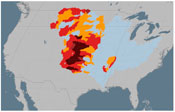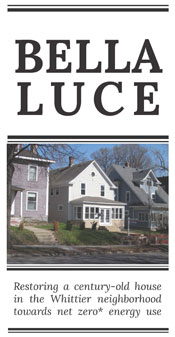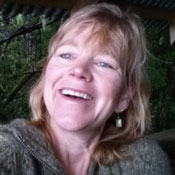EnviroThursday Spring 2016
Contact
Environmental StudiesOlin-Rice Science Center, Room 249 651-696-6274
esson@macalester.edu
instagram twitter
Presentations take place at 12 noon, Olin-Rice Room 250
February 11, 2016
No EnviroThursday – ES Majors/Minors Party
February 18, 2016

“Are We Using Up Our Water? Global Trends in Water Use and Water Availability”
Speaker: Kate A Brauman, Lead Scientist, Global Water Initiative, Institute on the Environment at the University of Minnesota
New global data let us see how and where we’re using water around the world. This provides a critical baseline for decisions about water management and taking action to reduce exposure to water risks. We’ll talk about how these global data are generated as well as what they might mean for the future of water.
Kate Brauman is the Lead Scientist for the Global Water Initiative at the University of Minnesota’s Institute on the Environment. Through research as diverse as payments for watershed services, global variation in “crop per drop”, and worldwide trends in water consumption and availability, Kate works to better understand how water use affects the environment and our ability to live well in it.
February 25, 2016
“Ecology and Geochemistry of Small Mammals – Deciphering Modern and Ancient Food Webs”
Speaker: Andrew Haveles, Visiting Asst. Professor, Geology Dept., Macalester College
Diet is an ecological trait that species may vary in response to biotic or environmental variations. Stable isotope analysis is one dietary metric that is transferable between modern and fossil populations permitting analysis of diet over various spatial and temporal scales. The presentation will walk through case studies based in the Great Plains that further our understanding of small mammal ecology and sets a baseline for interpreting similar data from different ecosystems and the fossil record.
Andrew Havels is a paleobiologist, modern ecologist, and stable isotope geochemist with research focused on using field and laboratory studies to understand ecological responses to ongoing and past environmental changes. His research typically includes stable isotope geochemistry for diet and environmental reconstructions in combination with other indicators of diet, physiology, movement, and environment.
March 3, 2016

“The Future is Back: Renovating a 100-year-old House to Net Energy Zero”
Speaker: Stewart Herman, Homeowner and Retired Teacher
Since late 2014, Stewart Herman has been renovating a 1906 house in the Whittier neighborhood of Minneapolis. The twin aims of the “total gut rehab” are to achieve net energy zero (where the house produces at least as much energy as it uses), and to restore and to enhance the attractiveness and comfort of the house. The project involves the intensive collaboration of architects and builders, and showcases emerging technologies. Incorporating solar and geothermal energy, and a thickly insulated building envelope, it is intended to show that the carbon footprint of a home can be reduced drastically by existing housing stock within the footprint of a typical urban lot. More information on the home
Stewart Herman recently retired. During the 1970s he wrote on energy policy (Energy Futures: Industry and the New Technologies, The Health Costs of Air Pollution) before proceeding to graduate work at the University of Chicago Divinity School and a quarter-century of teaching ethics in the Religion Department of Concordia College, Moorhead, MN, where he was also active in sustainability efforts.
March 10, 2015

“BioBiomimicry: Tapping Nature’s Genius for Today’s Challenges”
Speaker: Diana Hammer, Life Scientist/Biomimicry Professional, US EPA Region 8 Montana Office, Helena, Montana
Biomimicry is a newly established discipline which looks to nature as a model and a mentor of how we can live more sustainably on Earth. The seminar will describe biomimicry thinking as a systematic approach to tap nature’s 3.8 billion years of research and development and how we might use bio-inspired strategies to solve modern challenges.
Diana Hammer studied the environmental sciences at Macalester College, studied in India, and then lived for four years in Niger, West Africa, where she worked as a Peace Corps Volunteer and then for WWF/IUCN in Agro-forestry, Watershed Management, and Ethno-botany. Diana has worked for the US Environmental Protection Agency at HQ, in the Denver Regional Office, and currently works out of the Montana Field Office in Helena. She holds a Masters in Public Health from Johns Hopkins School of Public Health and is also a Certified Interpretive Guide (through the National Association of Interpretation). Diana has worked with communities and stakeholders at many levels and capacities for more than 20 years. A former Superfund Project Manager, one of her favorite projects included removal of a dam and restoration of a river and floodplain in western Montana. Diana is currently working with Tribal governments on environmental programs. She received her Masters of Science in Biomimicry from Arizona State University and her Biomimicry Professional Certification from Biomimicry 3.8 in December 2015.
March 17, 2016
No EnviroThursday – Spring Break
March 24, 2016 – ** canceled **
“Wheelchairs in the Wilderness: Nature in the Age of the Americans with Disabilities Act”
Speaker: Ryan Edgington, Ph.D. in environmental history, and former visiting professor at Macalester
This presentation explores how the idea of wilderness has changed and has been challenged since the passage of the Americans with Disabilities Act (ADA) in 1990. Ryan argues that by looking at disability services in wilderness areas, scholars can better understand how the idea of wilderness is constructed and contested. This project crosses disciplines by looking at the history of the idea of wilderness and modern conflicts over accessibility in national parks, wilderness designated areas, forest service lands, and co-managed lands. The project hinges upon history, public policy, and public administration scholarship. Crucially, Ryan focus on those peoples that use wheelchairs for mobility, explicitly on federal lands.
More broadly, this project seeks to uncover how ideas of wilderness (namely that it remains untrammeled by man) and the purpose of the ADA (to allow access to all) have created both opportunities for accessibility to wilderness and conundrums for public land managers that must adhere to the integrity of the perceived idea of wilderness as accessible to all while also wrestling with the realities of environmental terrain. Ryan seeks to understand how nonprofits organizations have both welcomed and challenged ADA implementation in wilderness. This is the first work of its kind, and sets a precedent for how the public should best understand who should have access to wilderness.
Ryan Edgington holds a Ph.D. in environmental history from Temple University (2008) and an M.A. and B.A. (2003, 1999) in history from the University of New Mexico. He is currently an M.A. student in the School of Public Administration at the University of New Mexico and an Intern for Congresswoman Michelle Lujan Grisham. His first book, Range Wars: The Environmental Contest for White Sands Missile Range, was published by the University of Nebraska Press (2014).
Ryan taught at Macalester College from 2012 to 2015 in both history and environmental studies.
March 31, 2016
“The Sun Doesn’t Always Shine and the Wind Doesn’t Always Blow: Managing Intermittent Renewable Energy on the Grid”
Speaker: Jim Doyle, Professor, Physics and Astronomy Dept., Macalester College
Climate change mitigation will require dramatic reduction of fossil fuel use in favor of renewable energy technologies. Because of their relatively low and decreasing costs, the most viable renewable energy options for the near term are solar and wind power. Current electric grid technology requires that energy production is closely matched to energy demand. However, both wind and solar are intermittent as well as unpredictable, making large scale integration of these technologies with the electric grid problematic. In this talk we will review proposals to solve this “load balancing” problem, such as energy storage and geographical expansion of the grid, and the technological and economic issues associated with these proposals. Preliminary results of our own modeling efforts will also be presented.
April 7, 2016
“Minnesota Pollution Control Agency and Environmental Justice”
Speaker: Karen Solas, Environmental Justice Analyst, Minnesota Pollution Control Agency
The Minnesota Pollution Control Agency (MPCA) is the state’s environmental protection agency, charged with protecting and improving our environment and enhancing human health. The MPCA has recently renewed and strengthened its commitment to environmental justice. This means working to ensure that pollution does not have a disproportionate impact on any group of people, and that all people — regardless of their race, color, national origin or income — benefit from equal levels of environmental protection and have opportunities to participate in decisions that may affect their environment or health. We’ll talk about the agency’s new environmental justice framework and the work that is being done to implement it, as well as current environmental justice issues, challenges, and opportunities on Minnesota.
Karen Solas has a background in natural resources and anthropology, with extensive experience in program management, community engagement, and tackling environmental issues at both the nonprofit and government level. Her previous work has included managing volunteer ecological restoration projects, coordinating educational and interpretive programming, and directing MN GreenCorps, a statewide environmentally focused AmeriCorps program.
April 14, 2016
Environmental Studies Honors Thesis Presentations
“Constituting and Contesting Development in Bolivia, Vietnam, and Turkey: Environment, Development, and Civil Society in the Neoliberal Era”
by Laura Humes ’16
With particular focus on the ascendancy of neoliberalism within the development regimes of Bolivia, Vietman, and Turkey, this presentation explores how the process of development presents a unique opportunity for civil society to consolidate power in relation to the state, codifying new modes of environmental governance.
“Lavoisier’s Legacy: The Dominance of Modern Water Quality Science”
by Olivia Nelson ’16
This summer, the nation watched as water quality experts continually deemed Flint’s tap water safe, while residents knew it was not and were forced to use the water until water quality science and management caught up. In most sciences, the inability for a scientific paradigm to predict an anticipated outcome is acknowledged as a failure of the science. In water quality science, however, this is not the case. Instead, it is commonly chalked up as a failure to test or consider the precise indicator that failed, without ever really changing the standard testing procedure that caused it to fail in the first place. This presentation will unpack the cultural and historical roots of modern water quality science, the values and methods implicit in that paradigm, and how it renders other forms of knowledge and values about water illegitimate. The presentation will draw particularly from two case studies: one featuring arsenic poisoning in Bangladesh and another featuring a mining threat in Ecuador.
April 21, 2016
3:30 pm – Olin-Rice 241
“Environmental Studies Senior Seminar Capstone Presentation”
Speakers: Senior Seminar Students
Last year Minnesota beekeepers lost over 50% of their beehives. Why? Habitat loss, pesticide use, parasites, disease, and changing landscapes. This spring the Environmental Studies Senior Seminar designed a variety of projects about the complicated topic of pollinator decline, working in collaboration with Erin Rupp ’04 and her organization, Pollinate Minnesota (www.pollinatemn.org), with assistance from the Pesticide Action Network. Please join us to hear the seniors present their work.